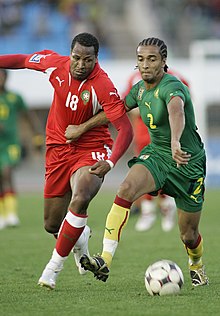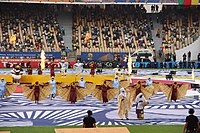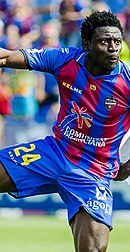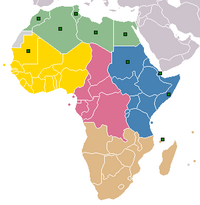Portal:Football in Africa
Introduction
Football is the most popular sport in Africa. Indeed, football is probably the most popular sport in every African country, although rugby and cricket are also very popular in South Africa. (Full article...)
This section may be unbalanced towards certain viewpoints. (October 2022) |
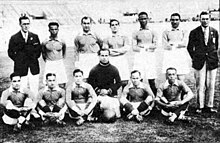
Selected article -
The African Nations Championship, (in French Championnat d'Afrique des Nations) known for sponsorship purposes as the TotalEnergies African Nations Championship and commonly abbreviated as CHAN, is a biennial African association football tournament organized by the Confederation of African Football (CAF) since 2009 and first announced on 11 September 2007. The participating nations must consist of players playing in their national league competitions.
The Democratic Republic of the Congo (DR Congo for short) and Morocco are the most successful teams in this tournament with two titles each, followed by Tunisia, Libya and incumbent champions Senegal with one each. The tournament began life in 2009 with 8 teams, which was doubled for the 2nd edition up until the 6th and is currently contested by 18 teams since the 2022 edition.
Since the 2014 edition, matches of every edition of this tournament from qualification to the final will be computed to calculate the forthcoming FIFA World Rankings following its conclusion, which CAF exclaimed at the time as "an important step for the competition's development". At the time, FIFA considers the tournament "friendly" since it is restricted to players from local leagues to participate. The tournament is held biennially and alternates with the Africa Cup of Nations.
Selected biography -
After leaving Nigeria for Italy at age 16, he has since played for a number of top-division clubs around Europe. He began his senior career in 2002 at the Italian Serie A club Inter Milan, before moving to the English Premier League club Newcastle in 2006, and then the German Bundesliga club Wolfsburg in 2009. Having joined Russian Premier League side Rubin Kazan in July 2010, they loaned him to Birmingham City in January 2011. In 2012, he moved to Spain to play for Levante, spending seven months at the club before joining Seattle Sounders FC in Major League Soccer.
In club football, Martins has won the Italian Serie A title, the Italian Cup (twice), and the Super Cup, all with Inter. With Birmingham he scored the winning goal in the 2011 Football League Cup Final. He has played European football with Inter, Newcastle and Wolfsburg, winning the UEFA Intertoto Cup with Newcastle. His highest scoring league seasons so far have seen him score 11 goals in the 2004–05 Serie A, and 17 2006–07 English Premier League. In international football, Martins has been in the Nigerian squad for the Africa Cup of Nations in 2006, 2008 and 2010, and for the FIFA World Cup in 2010.
Selected image -
 |
Australian Footballers in Durban South Africa, 1900
Subcategories
Related portals
More sports portals
WikiProjects
Related task forces and sub-projects
African football task force
WikiProject Africa • WikiProject Football
WikiProject Football task forces and sub-projects
 | |
| Wikipedia ads | file info – #250 |
Topics
Open tasks

- Expand stubs: Competitions in Africa • Organizations
- Expand club articles of teams from Africa.
- Expand biographies of Africans involved in football.
- Create: Requested articles • Most wanted football articles • Requested general football articles
- Add: Infoboxes • Images (General requests, Requested images of people)
- Review: articles currently under review
- Assess: Assessment requests • Assess an article
- Revert vandalism on this portal and on African football articles
- Assist in maintaining this portal and keeping its selected content up to date.
- WikiNews: Create and submit news stories about African football for Wikipedia's sister project WikiNews.
Associated Wikimedia
The following Wikimedia Foundation sister projects provide more on this subject:
-
Commons
Free media repository -
Wikibooks
Free textbooks and manuals -
Wikidata
Free knowledge base -
Wikinews
Free-content news -
Wikiquote
Collection of quotations -
Wikisource
Free-content library -
Wikiversity
Free learning tools -
Wiktionary
Dictionary and thesaurus
More portals
Sources

- ^ "The History Of Soccer In Africa". NPR.org. 2010-06-09. Retrieved 2016-03-31.
- ^ a b c Alegi, Peter (2010). African Soccerscapes. Ohio University Press. pp. 1–2. ISBN 9780896802780.
- ^ Frimpong, Enoch Darfah. "Ghana news: A world of superstition, frustration and disillusionment - Graphic Online". Retrieved 23 September 2017.
- ^ Lacey, Marc (8 August 2002). "Kangemi Journal; For Spellbinding Soccer, the Juju Man's on the Ball". The New York Times. NY Times. Retrieved 2016-03-31.
- ^ "World Cup Witchcraft: Africa Teams Turn to Magic for Aid". National Geographic. Archived from the original on July 10, 2006. Retrieved 2016-03-31.
- ^ Andy Mitten (September 2010). The Rough Guide to Cult Football. Rough Guides UK. ISBN 9781405387965. Retrieved 2016-04-02.
- ^ "African Nations Cup overshadowed by hocus pocus | Football". The Guardian. Retrieved 2016-04-09.
- ^ Kuper, Simon (2006). Soccer Against the Enemy: How the World's Most Popular Sport Starts and Stops Wars, Fuels Revolutions, and Keeps Dictators in Power. Nation Books. p. 123. ISBN 978-1-56025-878-0.


